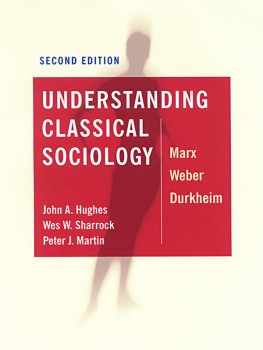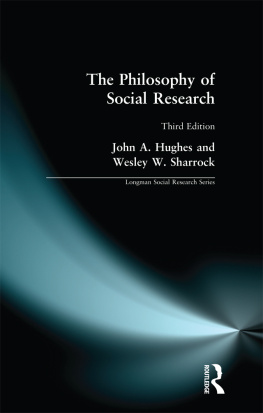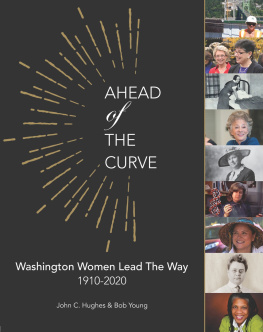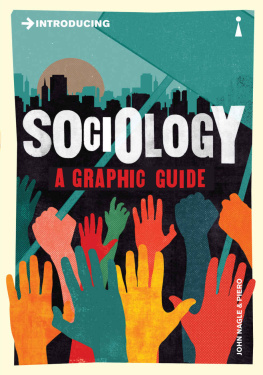2003 John A. Hughes, W.W. Sharrock and Peter J. Martin
First published 1995. Reprinted in 1995, 1996, 1997, 1998, 1999, 2001
All rights reserved. No part of this publication may be reproduced, stored in a retrieval system, transmitted or utilized in any form or by any means, electronic, mechanical, photocopying, recording or otherwise, without permission in writing from the Publishers.
| SAGE Publications Ltd
6 Bonhill Street
London EC2A 4PU |
SAGE Publications Inc
2455 Teller Road
Thousand Oaks, California 91320 |
SAGE Publications India Pvt Ltd
B42 Panchsheel Enclave
Post Box 4109
New Delhi 100 017 |
British Library Cataloguing in Publication data
A catalogue record for this book is available from the British Library
ISBN 0 7619 5466 x
ISBN 0 7619 5467 8
Library of Congress control number available
Printed in Great Britain by The Cromwell Press, Trowbridge, Wiltshire
Preface
As with the first edition of this book, the second has taken longer than we envisaged and again we need to thank Sage for their forbearance and patience. In this case a major reason for the delay was preparing the companion volume, Understanding Modern Sociology, a no less formidable challenge than producing this book for the first time. As always, trying to state complex ideas as clearly as possible, making sure that we had reasonably covered all the arguments and debates, were considerable tasks.
As we said in the original edition, what prompted the idea for a book of this kind was the feeling that many of our students had insufficient knowledge of the classic thinkers and had, in effect and in no small part due to the urgings of postmodernist thinkers, given up on the idea of a sociological tradition. Although, as sociological dinosaurs, we felt not a little aggrieved at such neglect, we also felt that the sociological tradition was itself an important source of these new ideas and arguments and ignoring it could only impoverish understanding. As we have said many times, sociology is, among other things, an argumentative discipline without settled principles, no theories that all would subscribe to and no methods of research which would receive universal assent. What there is, instead, is a tradition of ideas which try to formulate the idea of the social as a topic of systematic inquiry and, moreover, despite well over a century of effort, this attempt continues.
Another reason for the seeming neglect of the classic thinkers, as we said in the Preface to the first edition, is that in recent years efforts to reconfigure disciplines into more appealing disciplinary packages have blurred what were the already vague boundaries of the discipline even more. We do not object to such efforts (after all, we earn much of our bread and butter in teaching on them) but we do want to note the extent to which there is a danger of the sociological tradition becoming lost. There is, too, and as already noted, the influence of postmodernist thinking which tends to underplay the achievements of such as Marx, Weber and Durkheim as no longer relevant to a postmodern era. Whatever the merits or otherwise of such arguments, it is important to remind ourselves that they are but the product of one point of view within sociology and, what is more, a point of view which has a close affinity with the concerns which motivated these classic thinkers.
However, and despite the fact that we still share the above concerns, the sales of the first edition have far exceeded our anticipations. If this means a renewed interest in the sociological tradition, then all well and good, though we do not claim that this book necessarily has had much to do with such a shift, although we would like to think that it has helped in its own small way. We have always held that sociology is a great deal harder than it is often made out to be. As we said before, and as our exposition will try to make clear, Marx, Weber and Durkheim each spent much of their respective lives trying to formulate ways in which the social could be made the subject of disciplined inquiry. That they failed to settle this once and for all is a measure not of their overambition but of the great difficulty of the task.
The major substantial changes to the text are contained in the final concluding chapter. Wisely or not, we felt that updating the various commentaries on the three thinkers might better be served by comparing them a little more directly in light of contemporary themes in social thought. We have also taken the opportunity to be a little more opinionated and argumentative than we allowed ourselves to be in the substantive chapters and in the first edition. Changes to the separate chapters are minor except that the sections on Hegel in have been extensively rewritten to make them, or so we hope, clearer not only as an account of Hegels thought but also his influence on Marx himself.
Inevitably there are a number of people to thank for their generous help and advice during the progress of this book. In addition to those mentioned in the original volume we would like to thank Karen, Cath, Claire and Penny, all at Lancaster, who made sure that other commitments, such as teaching, meetings, TQAs, RAEs, mission statements, learning outcomes, etc., were met as the months dragged on. Thanks, too, to Mark who shouldered a considerable research burden. Also, thanks for a variety of services rendered by the regulars of the John O Gaunt, the Grafton and the Selbourne; to Tina, Yvonne, Margaret and, finally but not least, to all our sociological colleagues.
BEGINNING CHAPTER ONE
In this chapter we will outline the main background themes which concerned the classic writers, Marx, Durkheim and Weber. These themes were preoccupations in social thought from the beginning of the 19th century and include:
- Sociologys intellectual character and the ideas which played an important part in formulating the very idea of sociology as a discipline.
- Sociologys critique of individualism and its conservative reaction against the Enlightenment.
- Sociology as a science.
- Understandings of the nature of society.
- The relationship between sociology and history.
It may seem strange to be offering an exposition of the ideas of Marx, Weber and Durkheim in an era when, so it is argued by some in the discipline, the grand narratives of thought, as Lyotard (1984) terms overarching theoretical schemes, have lost their validity. New identities, new forms of knowledge, new patterns of social relationships, new sources of division, and more, are all forcing a break, it is claimed, with a past shaped by modes of thought originating over three hundred years ago during the Enlightenment. Marx, Weber and Durkheim are Victorian scholars and it is perhaps hard to grasp that they have anything of relevance to say to a world which has dramatically changed since their time.
Of course, there has always been a prominent strand in sociological thought which is sensitive to the idea that the world or the discipline, most often both, is in an impending state of crisis. Indeed, a strong case can be made that such a sense was critical in the very formation of the discipline in the early nineteenth century as industrialism began to effect major changes in patterns of life throughout Europe. Later in that century, a young French philosophy teacher was particularly concerned with what he saw as the growing instability of social life. Long-established values and ways of life seemed to be breaking down as industrialisation and urbanisation transformed the society of his day. Where once the authority of church and monarchy had gone unquestioned, there now seemed to be no authority which could hold society together. Employers and workers confronted each other with undisguised hostility, rates of crime were rising and individuals tended to see each other simply as means to achieve their own selfish ends. Suicides, too, were increasing as the old links to family and community grew weaker. The young Frenchman, says one commentator, was haunted by the thought that modern society was a fragile affair, a potentially unstable mix of elements that was always on the verge of dissolving into chaos. His writings were an effort to try to understand how this state of affairs had arisen so that it could be put right, stressing the urgency of this task, as though he saw himself in a race against time with the gathering forces of anarchy (Parkin, 1992: 59). The worried young thinker was mile Durkheim, who addressed these problems in his first major work,













